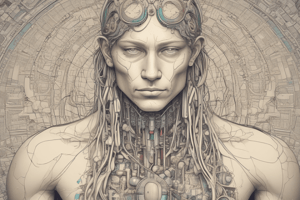Podcast
Questions and Answers
What are releasing hormones and inhibiting hormones primarily responsible for?
What are releasing hormones and inhibiting hormones primarily responsible for?
- Inhibiting the production of luteinizing hormone
- Directly stimulating the adrenal glands
- Producing sex steroids
- Controlling the release of other hormones (correct)
What is another name for inhibiting hormones?
What is another name for inhibiting hormones?
- Tropic hormones
- Liberins
- Releasing factors
- Statins (correct)
Which hormone is responsible for the release of follicle-stimulating hormone (FSH) and luteinizing hormone (LH)?
Which hormone is responsible for the release of follicle-stimulating hormone (FSH) and luteinizing hormone (LH)?
- Corticotrophin-releasing hormone (CRH)
- Gonadotropin-releasing hormone (GnRH) (correct)
- Sex steroids
- Adrenocorticotrophic hormone (ACTH)
Where is CRH produced?
Where is CRH produced?
What is the principal function of gonadotropins and sex steroids?
What is the principal function of gonadotropins and sex steroids?
What is the principal function of the Central Nervous System (CNS)?
What is the principal function of the Central Nervous System (CNS)?
Which two organs make up the Central Nervous System (CNS)?
Which two organs make up the Central Nervous System (CNS)?
What encases and protects the brain and spinal cord?
What encases and protects the brain and spinal cord?
What are the components of the brain?
What are the components of the brain?
Where is the Central Nervous System (CNS) located in the body?
Where is the Central Nervous System (CNS) located in the body?
Flashcards are hidden until you start studying
Study Notes
Hormones and the Central Nervous System (CNS)
Hormones
- Releasing hormones stimulate the release of other hormones, while inhibiting hormones suppress the release of other hormones
- Inhibiting hormones are also known as hypothalamic inhibiting hormones
- Gonadotropin-releasing hormone (GnRH) stimulates the release of follicle-stimulating hormone (FSH) and luteinizing hormone (LH)
- Corticotropin-releasing hormone (CRH) is produced in the hypothalamus
- The principal function of gonadotropins and sex steroids is to regulate growth, development, and reproductive processes
Central Nervous System (CNS)
- The principal function of the CNS is to integrate and process information, and to control voluntary movements and responses
- The CNS consists of the brain and spinal cord
- The CNS is protected by the meninges, a protective membrane that encases and protects the brain and spinal cord
- The components of the brain include the cerebrum, cerebellum, brainstem, and limbic system
- The CNS is located in the skull and spinal column of the body
Studying That Suits You
Use AI to generate personalized quizzes and flashcards to suit your learning preferences.



